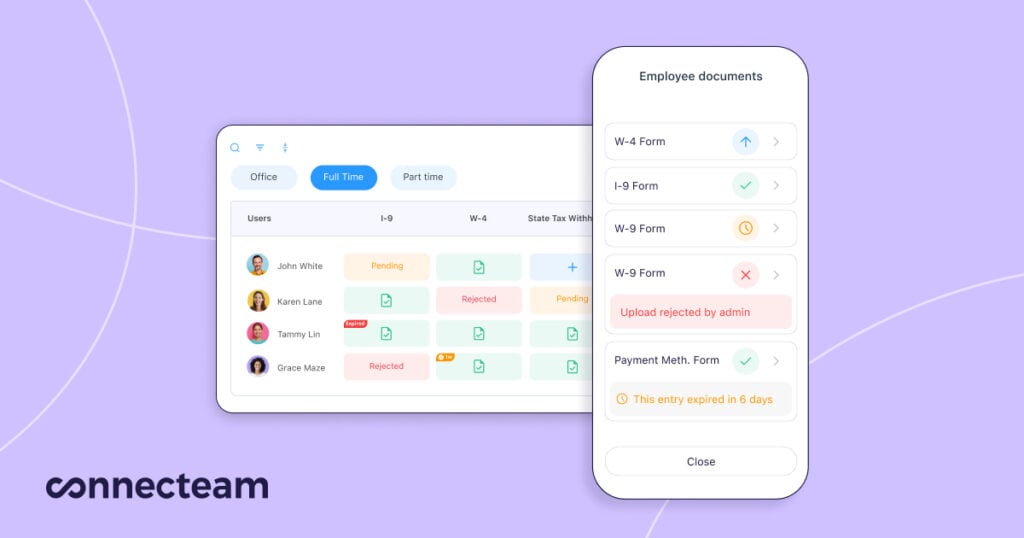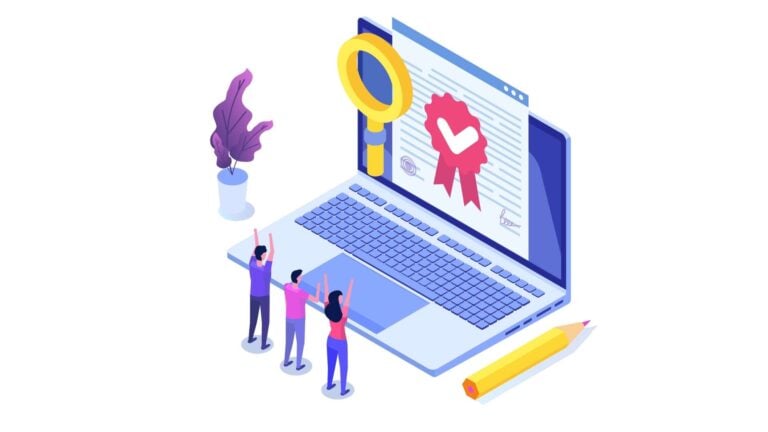Learn about the essential healthcare licenses for compliant healthcare business operations. We cover license types, how to apply, and FAQs.
Understanding healthcare licenses is an essential aspect of running a healthcare business. However, the licensing landscape can be confusing, and mistakes can be costly.
To help you out, this article gives you a general overview of the types of licenses your healthcare business and employees may need.
Key Takeaways
- Different types of healthcare licenses include facility, medical doctor (MD), registered nurse (RN), pharmacist, and Drug Enforcement Agency licenses.
- Healthcare organizations may need to apply for business licenses to cover the type of product or service they offer. In addition to business licenses, individual healthcare employees typically require a license to practice in the United States.
- Healthcare licensure is regulated at the state level.
- Eligibility, the application process, and requirements vary between states and types of licenses. Check with your state’s healthcare licensing boards to determine which licenses you need for your business and staff and how to apply for them.
What is a healthcare license?
A healthcare license gives healthcare organizations, physicians, nurses, dentists, and other medical professionals formal permission to work in the state that issues the license.
These licenses are governed by state laws and issued by state licensing boards or authorities. Businesses with locations in multiple states or professionals who practice across state lines must obtain a license from each state they work in.
This Might Interest You
Applying for the necessary healthcare licenses is one step in setting up a healthcare business. Learn what else you must do in our comprehensive 9-step guide to starting a healthcare business.
What are the different types of healthcare licenses?
The different types of healthcare licenses in the US include:
- Facility license
- Healthcare product license
- Pharmacy license
- Medical Doctor (MD) license
- Doctor of Osteopathic (DO) medicine license
- Doctor of dental surgery (DDS) or doctor of dental medicine (DMD)
- Registered nurse (RN)
- Licensed practical nurse (LPN) or licensed vocational nurse (LVN)
- Pharmacist license
- Permanent license
- Temporary license
- Locum tenens license
Business licenses
When setting up a healthcare business, you may need to apply for several business licenses.
The business license requirements for your organization depend on where it is located and the nature of the products or services it provides.
- Facility license
Many states require heathcare facilities that provide direct patient care—such as hospitals, nursing homes, and hospices—to apply for a facility license.
- Healthcare product license
If your business manufactures, produces, distributes, or sells certain products, including medical devices, medical oxygen, and pharmaceutical drugs, you likely need to apply for a license.
- Pharmacy license
In addition to requiring individual pharmacist licenses, most states also mandate that pharmacies obtain a license at the business level.
Individual licenses
States may require other licenses for particular roles or specialties. Your staff may also need multiple licenses, so check the healthcare licensing requirements in your state carefully.
2. Medical Doctor (MD) license
Physicians require a medical license to generally practice medicine and diagnose and treat patients.
Here’s a list of state medical licensing boards for more information.
Some states have signed an Interstate Medical Licensure Compact, which gives individuals who work in several states access to a streamlined license application process. A list of states that participate in the agreement is available here.
3. Doctor of Osteopathic (DO) medicine license
DO licenses are for osteopathic physicians. Like an MD license, these licenses allow physicians to practice medicine and perform surgery.
4. Doctor of dental surgery (DDS) or doctor of dental medicine (DMD)
Dentists must also be licensed. State boards of dentistry or dental examiners issue these licenses.
5. Registered nurse (RN)
Registered nurses provide direct care to patients across all specialty areas, including emergency and surgery.
A list of state nursing licensing boards is available here.
6. Licensed practical nurse (LPN) or licensed vocational nurse (LVN)
LPNs or LVNs perform a more limited range of tasks under the direction of doctors or RNs. The specific tasks they can do vary between states but may include monitoring vital signs, changing wound dressings, and helping patients to eat and bathe.
State licensing boards may use the terms LPN or LVN interchangeably.
7. Pharmacist license
To become a licensed pharmacist, individuals must sit the North American Pharmacist Licensure Exam (NAPLEX) and apply to their state board of pharmacy for a license.
The National Association of Boards of Pharmacy (NABP) has a list of state boards of pharmacy.
Duration-based licenses
States may offer different types of medical licenses for physicians based on duration.
Permanent license
A permanent medical license must typically be renewed after 1 or 2 years.
Temporary license
Some states provide temporary licenses that allow healthcare professionals to practice while their permanent license application is being processed.
Locum tenens license
Some states also offer locum tenens licenses to physicians on short-term, temporary contracts in states where they do not live. These licenses typically only give physicians the right to work in a state for a few days or weeks.
Pro Tip
Locum tenens is Latin for “to hold the place of.” In the healthcare industry, it refers to practitioners who cover temporary absences or staff shortages.
Why Is It Important To Get a Healthcare License?
Healthcare licensing regulates the healthcare industry, ensuring patients receive quality care. They set standards that organizations and individuals must meet to deliver health services. By including training and education requirements, licenses ensure medical professionals maintain the skills to deliver effective patient care.
Healthcare licenses are required by law. If you don’t have the licenses your business and staff need, you risk facing penalties, criminal charges, and professional disciplinary action.
For example, in California, a medical practitioner who practices without a license can be charged with a misdemeanor or felony with a maximum penalty of up to 3 years in jail and a fine of up to $10,000.
Did You Know?
There is a difference between healthcare licenses and certifications for individuals. Licenses are mandatory and confirm a practitioner has the required training, skills, and knowledge to practice. Certifications are usually voluntary—with some exceptions, like CPR— and demonstrate specialized knowledge in a specific area that adds to a practitioner’s credibility.
How Long Does It Take To Get a Healthcare License?
The length of the application process varies between different licenses. It may take between 2 and 12 months, and delays may occur. Check with the relevant licensing authority to confirm estimated processing times.
Healthcare licenses also must be renewed regularly. If you run a healthcare business, keep track of licensing renewals and notify staff when they need to renew theirs.
Pro Tip
Using software like Connecteam is a great way to stay on top of licensing renewal dates easily. With Connecteam’s documents feature, you can store licenses and set their expiration dates so you and your employees receive renewal reminders.

How To Apply for a Business Healthcare License
The requirements and process for applying for business licenses vary between states. Speak to your state licensing authority to get the relevant information for your business.
How To Apply for an Individual Healthcare License
The specific requirements for each license vary. Here’s an overview of the general process your staff needs to follow.
- Complete the necessary education and training
Healthcare licenses typically require applicants to complete medical school and postgraduate training.
- Gain clinical experience
Applicants typically must have completed several years of practical training in a clinical setting to apply for a license.
- Sit the licensing exams
Most licenses require applicants to pass specific licensing exams in addition to formal qualifications. These often involve a series of exams throughout the applicant’s education and clinical experience.
- Apply to the relevant licensing board
The relevant board depends on the type of license the applicant needs. Applicants are usually required to provide copies of their qualifications and other supporting documents, such as letters of recommendation.
They also may be asked to disclose any information relevant to their fitness to be a medical professional, including previous malpractice suits or criminal convictions.
The licensing board verifies applicants’ credentials and may conduct a background check. Where they do this, applicants usually need to attend a local police station to provide their fingerprints.
- Pay the license fee
Licensing fees vary depending on the license type and the state where the applicant is based.
- Renew the license
Healthcare licenses expire after a set time. Many are valid for 2 or 3 years only, after which they must be renewed. Your staff should confirm with the licensing board when they need to renew their license and the process to do this.
Some license renewals require applicants to have completed specific training requirements throughout the duration of the license.
Do You Need a License To Deliver Telehealth Services?
Medical practitioners must be licensed or otherwise authorized to deliver telehealth services in a state other than their own. How they do this depends on the requirements of the state where their telehealth patients are based.
The general rule is that a healthcare practitioner delivering out-of-state services must be licensed in the state where their patients are based.
Some states have specific telehealth licenses. Others require medical professionals to register to provide telehealth services.
For example, Florida allows telemedicine if the out-of-state physician meets specific requirements—such as holding an unrestricted license in their home state—and registers with Florida’s Telehealth Provider Registry.
If your staff practices telemedicine in different states, you should check the specific licensing requirements of those states.
Use Connecteam To Support Compliance With Healthcare Licensing Requirements
Knowing which licenses your company and employees need is essential when starting and running a healthcare business. Healthcare licensure is regulated at the state level, so check with your local licensing authorities to confirm which licenses you require and how to apply for them.
Connecteam is the perfect solution for managing your healthcare employees and staying compliant with licensing requirements. You can use it to securely store business and employee licenses, set reminders for license renewals, and message employees when they need to renew their licenses.
Discover how Connecteam can help with licensing compliance by signing up for free today!
FAQs:
What is the easiest medical license to get?
Indiana, Michigan, Florida, and New York have some of the most straightforward medical licensing processes. Medical licenses are often processed within 4 to 12 weeks in these states.
Is the US medical license exam hard?
The United States Medical Licensing Examination and Comprehensive Osteopathic Medical Licensing Examination are challenging. Candidates need to prepare extensively for them by studying, taking practice tests, and learning test-taking strategies.
Disclaimer
The information on this website about healthcare licenses in the US is intended to be a summary for informational purposes only. However, laws and regulations regularly change and may vary depending on individual circumstances. While we have made every effort to ensure the information provided is up to date and reliable, we cannot guarantee its completeness, accuracy, or applicability to your specific situation. Therefore, we strongly recommend that readers seek guidance from their legal department or a qualified attorney to ensure compliance with applicable laws and regulations. Please note that we cannot be held liable for any actions taken or not taken based on the information presented on this website.


